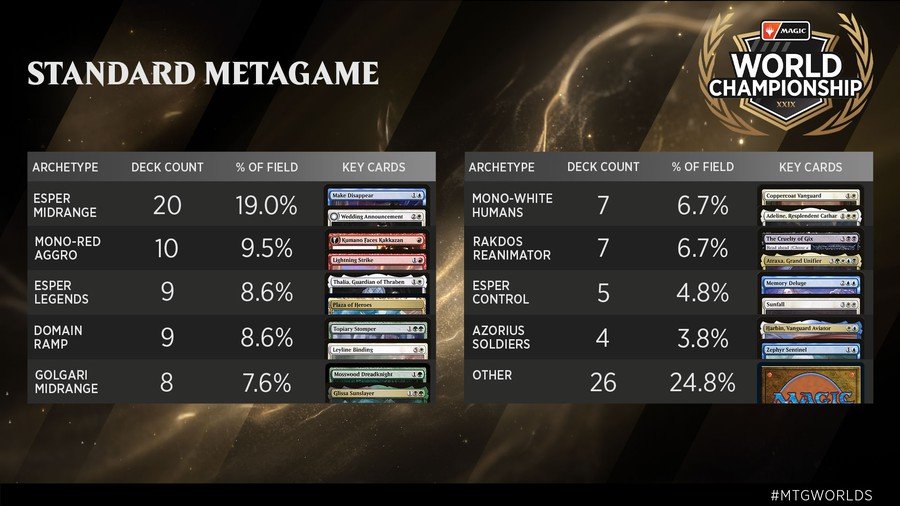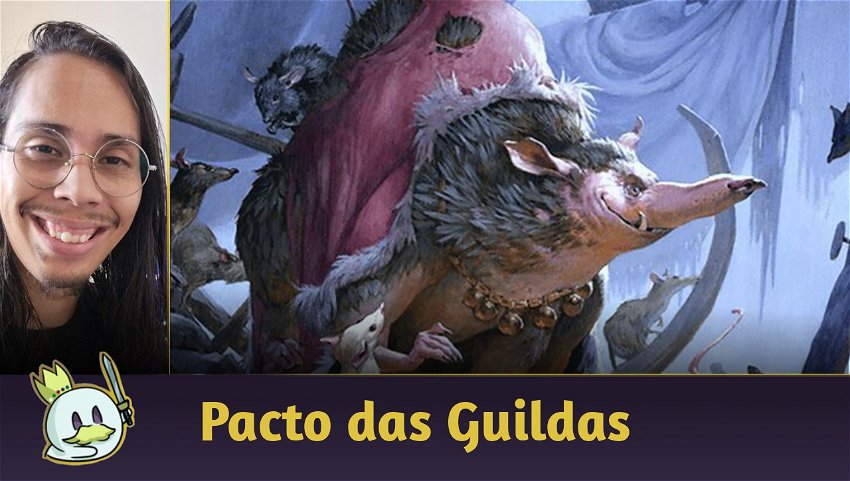Introduction
The Magic World Championship is the biggest Magic: The Gathering competition. In its 29th edition, the best players in the world will compete against each other playing Wilds of Eldraine
Draft formats and Standard on September 22nd, 23rd and 24th to decide who will be the next World Champion.
This competition's metagame gives us a wider view of Standard currently. With that, we can analyze the decks used and the impact possible Worlds results can bring to the format in the next few days.
Ad
Worlds Standard Metagame

Midrange
Esper Midrange continues to be the most played deck, just like it was in the last edition, but this time it is closer to other archetypes.
It is important to highlight the differences between Esper Midrange, Esper Legends, and Esper Control, as they can get mixed up due to their similarities, particularly the first two. The Midrange version uses around fifteen creatures, a few Planeswalkers and the most recent lists are using Virtue of Loyalty. Esper Legends, in turn, has a slightly more aggressive approach, with up to 30 creatures, almost all legendary, which gives it its name - and the most recent lists bring as a new addition Lord Skitter, Sewer King. Esper Control, as the name already tells us, is the Control version which counts with just a few win conditions, usually in the shape of The Wandering Emperor.
Together, these three represent 32% of the competition's metagame, proving these colors remain strong in the format, and have great odds in this World Championship. Restless Fortress also appears in some lists.

Aggro
Mono-Red Aggro and Mono-White Humans show up among the most played decks in the tournament, representing 9.6% and 6.7% of the metagame, respectively, both performing well in recent high-tier tournaments.
We can attribute this Aggro spike to the great variety of decks in the format, which creates an environment welcoming to faster strategies, besides, of course, the emergence of Cascade Combo, which was popular for a few days, but is an easy prey for Aggro.
Mono-Red was upgraded with Charming Scoundrel, Goddric, Cloaked Reveler and Monstrous Rage, which gave this list more firepower. Mono-White got Spellbook Vendor, a very strong creature which can easily spike out of control if it isn't answered soon.

Selesnya Enchantments was a bit behind, with only three copies of it in the competition, which made up 2.9% of the meta, but it still has shown to be a resilient option in the format with the new additions it got from WOE.

Reanimator and Ramp (5c Control)
Ramp (5c Control) is one of the most popular strategies in Standard currently, and at Worlds it was too. This archetype represents 8.6% of the meta, and it is one of this edition's strongest candidates. This deck became even more resilient with cards such as Up the Beanstalk and Bramble Familiar. I prepared a thorough guide on Ramp, which should be published soon.

Rakdos Reanimator was one of the most played decks in pre-ban Standard and really suffered with the loss of Fable of the Mirror-Breaker, but, surprisingly, this deck reappeared at Worlds with a new build, using Collector's Vault and Virtue of Persistence.
Ad
Restless Spire is another card that shows up in some lists. This strategy shows potential in this competition, as one of the most played decks.

Golgari and Sultai Midrange
One of the greatest new additions to the format is Golgari Midrange, which has two of the best cards WOE brought to Standard, Mosswood Dreadknight and Restless Cottage. The Sultai version splashes Blue to access counters and some value cards, such as Kaito Shizuki and Faerie Mastermind.

Tempo Decks
Azorius Soldiers was the main Tempo deck in the format at this competition, overcoming the newcomer Dimir Faeries, but both have their space. Soldiers is a more established deck in Standard, and always shows up in top rankings of big tournaments. This archetype didn't get any upgrades with Wilds of Eldraine, but that doesn't mean it doesn't deserve a highlight, even more as it is one of the top ten most played decks in the tournament.

Faeries got some spotlight with the release of WOE, and soon a deck dedicated to them came around. Dimir Faeries appeared only once in the competition, alongside its Sultai version, also appearing only once. It is still a new strategy, which didn't have time to show its potential yet. Worlds might be the best place to do that.

Combo Decks
WOE also made possible something that Standard didn't see for a long time: combos. Agatha's Soul Cauldron and Sleep-Cursed Faerie enabled an infinite mana combo in the format, exiling the Faerie with the cauldron and using Kami of Whispered Hopes in the Sultai version or Omen Hawker in Mono-Blue Cauldron.

Cascade Combo, in turn, uses the absurd value created by Invasion of Alara casting Bramble Familiar's Adventure for free to bring Cemetery Desecrator from the graveyard, transforming the Invasion, all that in one play.

Both decks have their weaknesses, but both show tremendous potential to reach inevitability very fast, and can catch many players off guard in the tournament.
Final Words
The World Championship will be an excellent stage to showcase the new Standard meta which formed after the bans and the arrival of Wilds of Eldraine. The format is still transforming, and should continue to change even after the tournament.
One more article down. I hope you liked it. Leave your questions or future article suggestions in the comment section, as I'll try to answer all. Until next time.









— 评论0
成为第一个发表评论的人